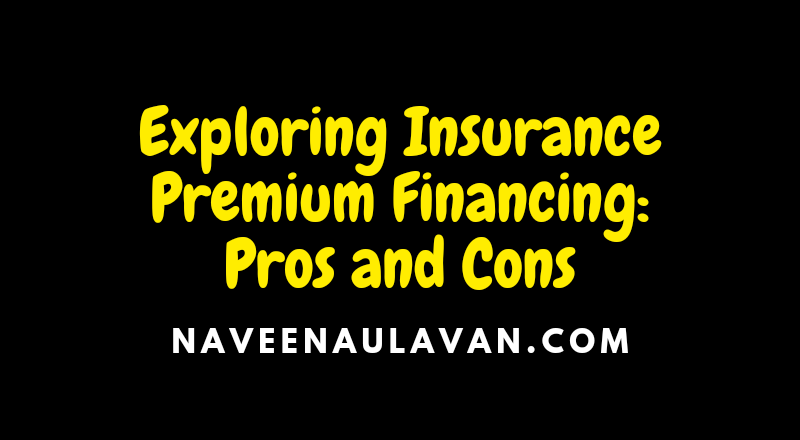Insurance premium financing is a financial arrangement where a third-party lender provides funds to policyholders to pay for their insurance premiums. This type of financing allows individuals or businesses to spread out the cost of their insurance premiums over time, rather than paying them in a lump sum. In this article, we will explore the pros and cons of insurance premium financing, helping you to make an informed decision if this is the right option for you.
Pros of Insurance Premium Financing
1. Enhanced Cash Flow Management
One of the main advantages of insurance premium financing is that it allows policyholders to manage their cash flow more effectively. Instead of having to pay a large sum upfront to cover the insurance premiums, individuals or businesses can spread out the cost over a predetermined period. This enables them to allocate their funds to other areas of their operations or personal finances, reducing the strain on their cash flow.
2. Access to Insurance Coverage
For some individuals or businesses, paying insurance premiums upfront may be financially burdensome, making it difficult for them to access the necessary insurance coverage. Insurance premium financing provides a solution by enabling policyholders to pay their premiums over time, making insurance coverage more attainable. This can be particularly beneficial for startups or small businesses with limited cash reserves.
3. Potential for Investment
By leveraging insurance premium financing, policyholders have the opportunity to invest the funds they would have otherwise used to pay their premiums upfront. Depending on the return on investment, this could potentially result in a higher overall financial gain compared to paying the premiums immediately. However, it is essential to assess the risks and consult with a financial advisor before making any investment decisions.
4. Flexibility in Repayment Terms
Insurance premium financing offers flexibility in terms of repayment. Policyholders have the option to choose the length of the financing period and the frequency of payments, allowing them to align their repayment plan with their cash flow and financial goals. This flexibility can be highly advantageous for individuals or businesses with fluctuating income streams.
Cons of Insurance Premium Financing
1. Additional Costs
One of the significant downsides of insurance premium financing is the additional costs associated with this type of financing. Lenders charge interest on the funds provided, resulting in an increased expense compared to paying the premiums upfront. Policyholders need to carefully evaluate whether the added cost is justifiable based on their financial situation and potential benefits of accessing insurance coverage without paying a lump sum.
2. Potential for Risk and Default
When entering into an insurance premium financing agreement, policyholders assume the risk of repayment. If they fail to make the required payments, there is a possibility of policy cancellation or other legal consequences. This risk factor should be carefully considered by individuals or businesses, ensuring that they have a reliable repayment plan in place before engaging in premium financing.
3. Limited Provider Options
Insurance premium financing is not widely available from all insurers or financial institutions. Therefore, individuals or businesses seeking premium financing may have limited provider options. This lack of competition can lead to higher interest rates or less favorable financing terms. It is crucial to research and compare available options to secure the most favorable terms possible.
4. Potential Impact on Credit Score
When applying for insurance premium financing, lenders may conduct a credit check on the policyholder. This inquiry can have a temporary negative impact on the individual’s or business’s credit score. While this impact is generally minimal, it is essential to consider the potential consequences for future borrowing or credit applications.
Conclusion
Insurance premium financing offers certain advantages in terms of cash flow management, increased accessibility to insurance coverage, investment opportunities, and repayment flexibility. However, it is important to carefully weigh these benefits against the potential downsides, such as additional costs, the risk of default, limited provider options, and potential impact on credit scores. Policyholders should thoroughly evaluate their financial situation and consult with professionals before deciding whether insurance premium financing is the right option for them.
